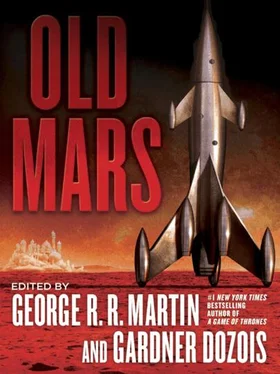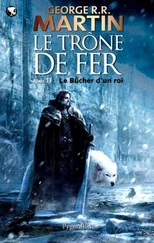Closer and closer the ship drew to the land beneath, now whipping past in a red-and-ochre blur beneath the keel. Strange mineral formations sped by on either side, fantastical shapes of orange stone like nothing Kidd had ever seen in all his travels. A broad canal filled with shining water, straight as a spar and stretching from horizon to horizon, appeared, then fell behind in a flash. And then came an astounding city—towering spires, broad streets, and just a glimpse of what might be the scuttling inhabitants. Kidd gaped at the apparition as it receded astern.
“Captain!” cried Sexton.
Kidd turned about to find a tremendous dune of red sand looming ahead, Sexton gesturing madly with his arms.
“Starboard sweeps down five points!” Kidd cried. “Larboard up five!”
The men groaned with effort as they strained to comply. The whole ship creaked and shuddered as she leaned heavily to starboard. Kidd and Sexton put their whole weight into the whipstaff, providing what little help they could with the rudder.
Ponderously, grudgingly, the hurtling ship’s course changed.
But not enough. They would not escape collision with the dune.
“All for’ard sweeps up! All aft sweeps down! Hold fast! And God save us all!”
With an enormous lurch, the prow rose up into the air, the horizon tilting madly as the ship reared back on her heel. Men cried out as the sudden change in bearing drove their sweeps hard against their bodies; one lost his grip and fell screaming down the length of the deck. Everywhere came the sound of ripping silk and the shuddering crack of tearing wood.
Kidd and Sexton scrabbled across the tilting deck to the binnacle and held on for dear life.
And then, with a horrific splintering crash, like God’s own broadside, the ship ran hard aground.
Kidd knelt in the cold sand, head bowed in an attitude of prayer. But he was not praying; he was merely resting his weary bones. Idly, he wondered if God heard the prayers of men on Mars.
The ship lay largely intact on the breast of the great soft dune of sand upon which she’d run aground. But the two lower masts had been smashed to splinters, and the hull bore two great gashes where they’d been rooted. The landing legs the carpenter had rigged had also torn away, taking with them several hull planks each. Cargo and coal lay scattered across a mile of sand. Somewhere out there, too, lay the bodies of three men who’d been thrown from the ship in the crash. Two more had died of their injuries; most of the rest were expected to recover. Kidd himself carried his left arm in a sling, counting himself lucky to have endured no more than a wrenched shoulder.
By day, the climate of Mars’s surface was not dissimilar from that of the air in the planet’s vicinity: cold and dry, with a thin wind that whistled across the vastness and whipped up dancing whirls of dust. But when the sun had set an hour after the wreck—the first darkness they’d seen after two months of sailing the shadowless air between planets—the cold had grown far deeper, biting hard even through Kidd’s heaviest coat. Most of the men had not even that much clothing to protect them. None of them had slept much, and the rising of the weak, wan sun had done little more than make the dismal situation more visible.
A chuffing sound of boots on sand made Kidd look up. It was Edmonds, the quartermaster, looking haggard and worn. “We’ve finished the inventory, sir.”
Kidd merely waited.
“There’s beef and pease for two months at half rations. But them water casks …” Edmonds shook his head. “Half of ’em sprung in the crash, sir. We’ve maybe two weeks.”
Kidd took a breath, not knowing what to say. Before he could form a reply, there came a shout from above. One of the men stood atop the ship’s prow, one foot braced on the fractured bowsprit, waving his arms and crying out words whose meaning was swept away by winds and lost in the vast thin desert air.
Awkwardly, Kidd levered himself to his feet and cupped his good hand behind his ear. “Say again?” he called.
The man made a speaking trumpet of his hands. “Martians!”
The natives somewhat resembled crabs—man-sized crabs with only four limbs, drawn out lengthwise and walking about on their hind legs. But though they had two arms and two legs, those limbs bent in all the wrong places, and both limbs and body were covered with a hard shell that shaded from white on the belly to the same red-ochre as the sand on the back. There was no distinct head, only a bulge at the top of the torso from which sprouted two black eyes on flexible stalks, like a lobster’s, and a vertical mouth like the working end of a blacksmith’s pincers. Each hand resembled a crab in itself, the fingers tipped with vicious-looking claws.
They waited in a group on the sand. There were over a hundred of them.
Kidd lowered his telescope and turned to Sexton. “D’ye suppose the savages speak English?”
Sexton looked terrible: his finery a shambles, wig long vanished, and cheeks gone black with stubble. “Unlikely. But they’re no savages.”
“How so?”
Sexton peered again through his telescope, and Kidd did the same. “Their clothing. Note the colors and patterns—very sophisticated. Somewhat reminiscent of Persian carpet. And especially that one in the center, the one with the hat. He appears to have jewelry at his shoulders and wrists.”
Kidd squinted, but still could not make out as much detail as the younger Sexton. “All I see is the swords.” Each native carried a long, thin sword, curved like a Persian shamshir, thrust scabbardless through his belt; smaller blades, likewise slim and curved, were also in evidence. They gleamed in the pale sunlight.
Sexton scoffed. “We are armed as well, are we not? And we are no savages.”
To that, Kidd had no reply.
Kidd did his best to hold his head high as he slogged awkwardly down the slope of soft sand, but between his injured arm and the satchelful of materials for negotiation—gold coins, glass beads, dried beef, a flask of water, a Bible—he had a hard time keeping his balance. The Martians, he noticed, had wide flexible feet well suited for walking on sand; their lower garments were loose pantaloons like the Hindoos’, cuffed at the knee, leaving the red-carapaced lower legs bare.
Focusing on these details helped keep Kidd from curling up on the sand in a terrified ball.
Sexton preceded him, holding out his open, empty hands. “We greet you in the name of King William III of England and Ireland, and II of Scotland.”
The Martian with the hat stepped forward from the rest. He had a distinct but not unpleasant odor, something between horses and cinnamon, and the bright metal fixed to his carapace at several points had the appearance of real gold. Chittering and clattering in his own language, he pointed one chitinous hand up to the sky, then swept it downward in a gesture that encompassed the Mars Adventure , the Englishmen, and the Martians as well. Then he stood silent, with folded hands.
Sexton and Kidd exchanged a glance. Even the natural philosopher was plainly baffled by this display. “Perhaps we should show him the Bible?” Kidd suggested. “He waved up at Heaven …”
“I’ve no better notion,” Sexton confessed. Kidd handed him the heavy book, and he opened it to Genesis. “This is our most sacred book,” Sexton said to the native, presenting it reverently, “and this is the story of the creation of the universe.”
The Martian took up the book, examining it on all sides with chittered commentary to his fellows. He ran crab-leg claws down the columns of text, as though reading, and tapped delicately at the leather cover and spine. He held the book close to his face, the eyes bending in together in a most disturbing manner.
Читать дальше












